Blog Post On IIPSJ Participates in Event at Copyright Office
IIPSJ Joins Copyright Office to Discuss Social Justice and Empowering Creators of Color to Protect Their Creative Works
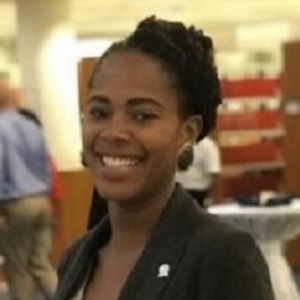
by Morgan Sills, Howard University School of Law ’21
On January 15 th the U.S. Copyright Office hosted a panel entitled “Copyright and Social Justice,” as part of its Copyright Matters series. The event explored the intersection of social justice and copyright protection, with a special focus on historically disadvantaged communities that are often unable to access protection for their work.
Opening remarks were given by Hakeem Jeffries, who is a U.S. Representative from New York and a member of the House Subcommittee on Courts, Intellectual Property, and the Internet. Representative Jeffries began the event by stressing the Constitution as the foundation of power for copyright protection and recognizing the emphasis placed on intellectual property rights by the Founding Fathers.
As the first panelist to speak, IIPSJ Founder, Professor Lateef Mtima, set the framework of the discussion by highlighting the social injustice surrounding communities that are unable to use the copyright system to protect their creations. As a result, the copyright system and structure of intellectual property rights as a whole both suffer from the exclusion of their talents and cultural contributions. IIPSJ’s Executive Director, Kim Tignor, reflected on the experiences of hip-hop groups like De La Soul and their noticeable absence from digital streaming services to illustrate the barriers faced by many artists today. She explained that there is a need to “decode” the copyright law so that artists can fairly profit from their efforts; and pointed out how the legal community often fails to educate creators on their ability to use digital space for the fair distribution of their work.
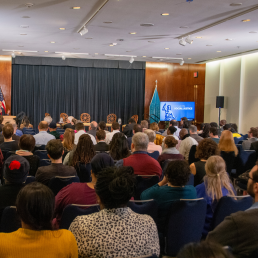
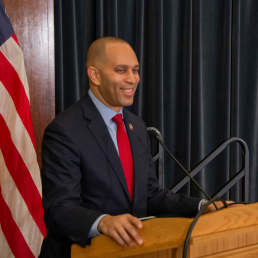
Hollis Wong Wear, a Grammy-nominated singer, songwriter, and producer, presented her perspective as an artist and advocate for other creatives. She voiced the idea that copyright lawyers can learn a great deal from artists and how legal regulations shape their reality, especially with expanded access through social media. She also used the example of Prince and his highly publicized fight against Warner Bros. to gain ownership of his master sound recordings, noting the social and economic impacts of such victories.
Law Professor and Co-Director of the IP Program at George Washington Law, Professor Robert Brauneis reported his findings after conducting research on thirty-five years of registration history. Consistent with the
reports of the previous panelists, Professor Brauneis reported that certain minority groups owned a significantly low number of actual copyright registrations compared to the amount of copyright eligible work they produced. He pointed to the CASE Act as a remedy for this situation, in
addition to the power of copyright attorneys and policy makers to serve creators and educate them on the best tools to benefit from their labor.
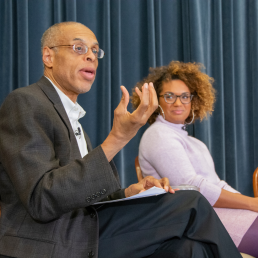
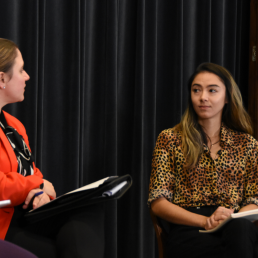
Patent, Trademark & Copyright Section
Services offered: Amicus briefs
Contact: Ralph P. Albrecht, Chair
(202) 216-8166
Eligibility criteria: No formal criteria
Regions covered: Nationwide in U.S.A.
Fees charged: None
Law School Clinic Certification Program
Services offered: This program allows applicants to obtain pro bono legal assistance in both patent and trademark matters while allowing law students enrolled in a participating law school’s clinic program to practice intellectual property law before the USPTO under the strict guidance of a law school faculty clinic supervisor.
Patent Pro Bono Program
Services offered: A nationwide network of independently operated academic and nonprofit organizations that endeavor to match volunteer patent practitioners with financially under-resourced inventors seeking patent protection.
Letter Supporting CASE Act
IIPSJ sends a letter to Congressman Jefferies supporting passage of the CASE Act.
The Institute for Intellectual Property and Social Justice (IIPSJ) hereby submits the following comments in support of passage of the Copyright Alternative in Small-Claims Enforcement Act of 2019 (HR 2426). IIPSJ was established to address the social justice implications of intellectual property law and policy both domestically and globally. IIPSJ’s work ranges broadly, and includes the scholarly examination of intellectual property law from the social justice perspective; advocacy for social justice-cognizant interpretation, application, and revision of the intellectual property law; efforts to increase the diversity of the intellectual property legal bar; and programs to empower historically and currently disadvantaged and marginalized communities through the development, protection, use, and exploitation of intellectual property.
Click here to read full letter.
IP Community Outreach, Education, and Pro Bono legal support
Recent E-Mail Update
This month our focus is on IP Community Outreach, Education, and Pro Bono legal support. IIPSJ is involved in various new initiatives to promote IP Empowerment and entrepreneurship in marginalized communities which we thought you might find of interest.
The Lawyers’ Committee for Civil Rights: Creative Control
This Fall the Lawyers’ Committee for Civil Rights will launch Creative Control – an initiative which will examine how intellectual property law and policy impacts historically marginalized communities and will provide pro bono IP legal support to community creators and innovators. The goal of Creative Control is to educate community creators and innovators as to the importance of IP rights and protections, to empower online expression, and to provide one-on-one free legal advice from IP attorneys.
LCCR hosted a soft launch of Creative Control at Smith Commons on July 25, 2017, at which more than 70 community creators joined IP experts for discussions on IP protection and how IP law and policy impact creators. In addition, LCCR collaborated with lawyers from the Hogan Lovells law firm to provide one-on-one legal sessions for 22 DC community creators.
IIPSJ Director Professor Lateef Mtima participated in the July soft launch of Creative Control – here’s a link to a sixty-second montage of the launch which highlights the diversity of the attendees and the legal and creative talent showcased during the event:
The official launch this Fall will also include the release of the LCCR white paper, know your (IP) rights primer and the commencement of the pro bono IP legal clinic component.
IP Pro Bono Clinic Database
We have recently updated our website to add a growing list of IP legal clinics and other resources for low or no cost legal services.
Other Topic of Interest
Recently, a federal district court judge struck down part of the copyright for the song “We Shall Overcome”. The song is of unknown origin and was particularly popular during the civil rights era. The copyright was held by several songwriters, including Pete Seeger, since the 1960’s for changes to the original melody and some of the wording. Part of the royalties from the copyright is used for social and cultural programs in the South.
You can read more in the New York Times article “'We Shall Overcome’ Verse Not Under Copyright, Judge Rules” or listen to a music news segment on National Public Radio “Federal Judge Rules First Verse Of 'We Shall Overcome' Public Domain.”
Follow-up on Net Neutrality – Last month we discussed the FCC rulemaking on Net Neutrality. We appreciate the many comments and questions we received in connection with our distribution on net neutrality, we thought you might be interested in formal comments file by National Hispanic Media Coalition regarding the social justice implications. You can find the full comments here and a summary here.
International IP
1. Copyright Implications of Renegotiating the North American Free Trade Agreement (“NAFTA”) – In May 2017, the United States Trade Representative (“USTR”) published a request for comments on the Trump administration objectives for renegotiation of NAFTA. Here are links that discuss some of the comments submitted on copyright and social justice concerns.
Re:Create Coalition: What They’re Saying: Protecting A Balanced Copyright System In NAFTA Renegotiations
Program on Information Justice and Intellectual Property (“PIJIP”): Copyright Balance as a NAFTA Negotiating Objective: Testimony to the Trade Policy Staff Committee
Creative Commons: Is Re-negotiating NAFTA Opening Pandora’s Box?
2. Updates on the Marrakesh (“Books for the Blind”) Treaty – In May we included an article announcing that the Electronic Information for Libraries (“EIFL”) library guide to the Marrakesh Treaty for persons with print disabilities is now available six languages: English, French, Lithuanian, Russian, Serbian, and Nepali. This month we bring some links for background on the treaty as well as an update on the status in the EU.
World Intellectual Property Organization (“WIPO”): The Marrakesh Treaty In Action
WIPO: Stevie Wonder to UN Member States: Help Others Beat the Odds Like I Did, Join Marrakesh Treaty
Intellectual Property Watch: EU Parliament Adopts Marrakesh Treaty; Blind Union Prepared To Fight Publisher ‘Compensation’
3. Copyright Reform in South Africa - The South African Parliament published a pending Bill amending the Copyright Act and a request for comments. Click here to read the pending Bill.
IP Watch: Lessons From South Africa: Protecting Non-Expressive Uses In Copyright Reform
Infojustice: Comments on South Africa's Copyright Amendment Bill (B13-2017)
4. Other Articles of Interest
Infojustice, reposted from EIFL: Course Packs for Education Ruled Legal in India
Public Knowledge: Net Neutrality Challenges in the World: Zero-Rating in the European Union
Reposted by Infojustice: German Federal Court of Justice Grants Compulsory License in Preliminary Proceedings
IIPSJ
Matal Tam
Matal v. Tam
On Monday, June 19, 2017, the Supreme Court held that the law prohibiting the federal registration of disparaging trademarks, part of Section 2(a) of the Lanham Act, was unconstitutional as viewpoint discrimination prohibited by the First Amendment guarantee of freedom of speech. Matal v. Tam, https://www.supremecourt.gov/opinions/slipopinion/16. The Court ruled 8-0 on the result and 8-0 on the theory of viewpoint discrimination, but split on a number of other issues considered by the Court. The social justice implications of this decision fall along several lines.
First, those who seek to "reclaim" disparaging words like "dykes" and "slants" will be able to use federally registered trademarks in support of their efforts to do so. This is empowering to such advocates. While some advocates of such "reclamation" strategies may find the Tam decision empowering, some other social justice advocates have raised competing concerns.
Second, the federal government will no longer be able to reject trademarks because they disparage a group or person. Trademarks like, STOP THE ISLAMISATION OF AMERICA, which the Federal Circuit (“CAFC”) previously affirmed a refusal to register the mark because it disparaged the Muslim community. Those with power and money are most likely to be able to exploit this change thereby further legitimating disparaging discourse not just in general, but also in the marketplace.
Third, the Court continues to support hate speech while ignoring the adverse impacts of it even in a quintessential commercial type of speech like trademarks.
Fourth, the implications of the Court's continuing shift toward formulaic evaluations of subtle freedom of expression issues signaled both in Reed v. Town of Gilbert from 2015 and in this case are troubling insofar as it results in more rigid rules with less room for balancing legitimate, strong, and even compelling interests against the extremely important, but not unlimited, right of freedom of expression.
Now that the disparagement provision has been struck down by the Supreme Court, we hope that Congress will work on a new version that can pass constitutional muster.
Many are also wondering how much of Section 2(a) of the Trademark statute, which also includes a ban on trademarks that are immoral or scandalous, will survive this decision. A decision from the CAFC may answer this question in the suspended case In re Brunetti, which appeals the TTAB decision affirming a refusal of FUCT under the scandalousness provision of the statute.
And we plan to continue the debate as well. We expect to have a lively panel discussion on this topic at our 2018 CLE program. And our own Professor Steven Jamar, who serves as the Institute’s Associate Director for International Programs, is currently preparing a journal article on the decision.
Below we have included links to recent articles further discussing the decision. And we invite you to post comments and questions on our Facebook page.
IIPSJ
Articles of interest on Matal v. Tam
https://ucsocialjustice.com/2017/06/23/supreme-court-offensive-speech-may-be-trademarked/#more-2883
Send an email to updates@iipsj.org with SUBSCRIBE in the subject line to receive these updates to your inbox.
IIPSJ IP and Civil Rights Conference | 2012
IIPSJ's IP and Civil Rights Conference was held on Thursday, May 17, 2012 at the Howard University School of Law. Rev. Jesse Jackson Sr. was the keynote speaker. The conference brochure in pdf form is available for download. The conference was cosponsored by IIPSJ and the Black Leadership Forum (BLF).
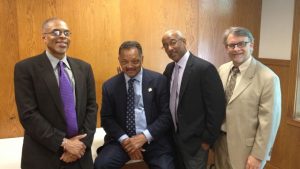
From left to right: IIPSJ Director Lateef Mtima; Rev. Jesse Jackson; Prof. Roger Groves (Fla. Coastal School of Law); IIPSJ Assoc. Dir. Steven Jamar at IIPSJ IP and Civil Rights Conference - May 17, 2012.
GSR Inn of Court
The Giles S. Rich Inn of Court for the Court of Appeals for the Federal Circuit
The Giles S. Rich Inn of Court is a professional organization dedicated to advancing the principals of civility and service in the legal profession. One of the Inn's major priorities is providing mentorship and support to newly admitted attorneys and law students interested in IP practice. Each year the Inn invites the participating law schools to select up to four students to participate as Pupil members in all of the Inn's programs and activities.
SInce IIPSJ's founding in 2002, it has developed a strong working relationship with the Giles S. Rich Inn of Court t for the Federal Circuit. IIPSJ Director Lateef Mtima is the current (2009-10) President of the Inn. He has been a member of it since 2003 and has held several other leadership positions in it. (President, ‘09-‘10; Vice-President, ‘08-‘09; Program Chair, ‘05-‘06; Mentoring and Scholarship Chair, ‘04-‘05).
Each year IIPSJ at HUSL's relationship with the GSR Inn provides four HUSL IP students with an especially valuable opportunity of being student members of the Inn of Court even before they become members of the bar. This provides an unparalleled opportunity for students to meet with and learn from practicing lawyers.
